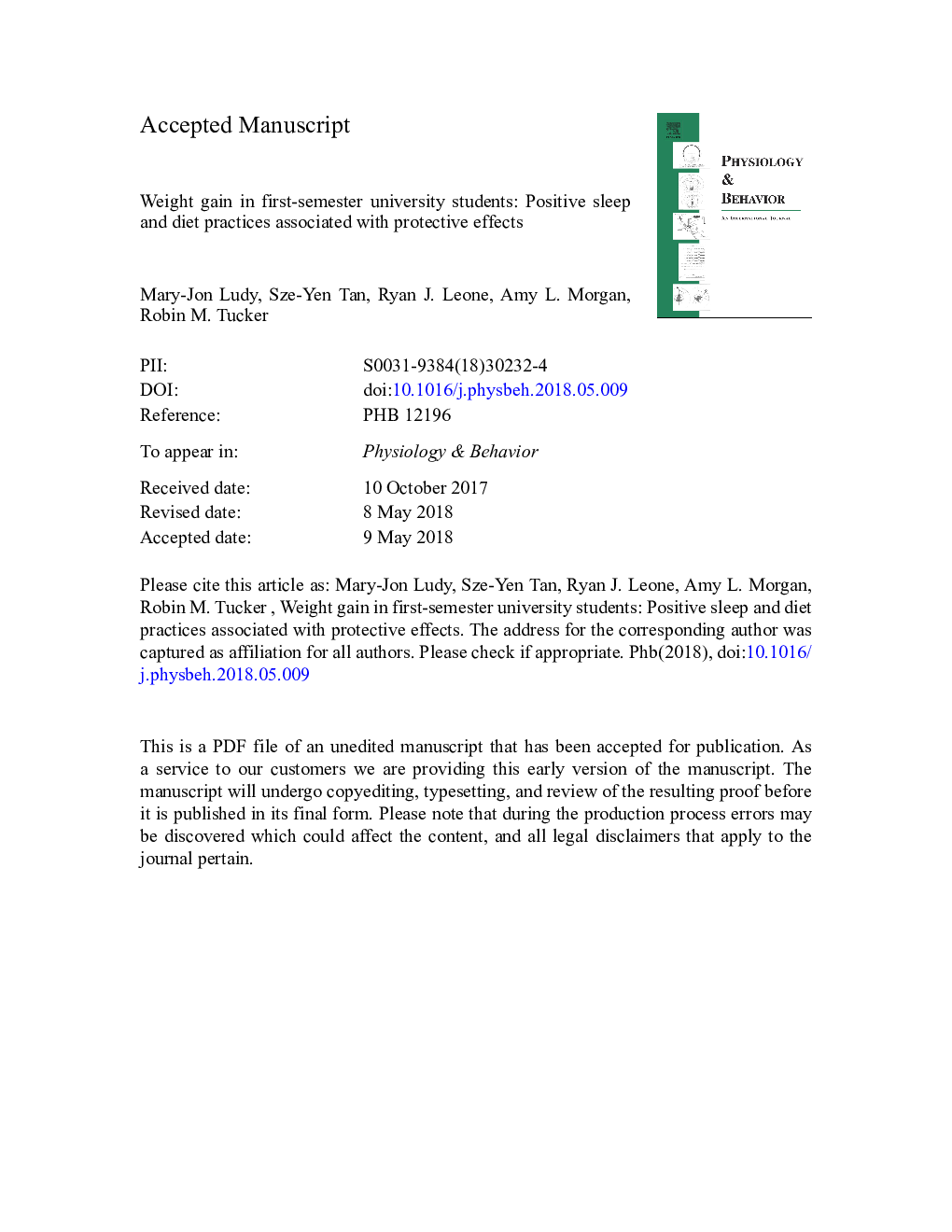| کد مقاله | کد نشریه | سال انتشار | مقاله انگلیسی | نسخه تمام متن |
|---|---|---|---|---|
| 8650246 | 1571124 | 2018 | 23 صفحه PDF | دانلود رایگان |
عنوان انگلیسی مقاله ISI
Weight gain in first-semester university students: Positive sleep and diet practices associated with protective effects
ترجمه فارسی عنوان
افزایش وزن در دانش آموزان دوره اول: خواب مثبت و رژیم غذایی مرتبط با اثرات محافظتی
دانلود مقاله + سفارش ترجمه
دانلود مقاله ISI انگلیسی
رایگان برای ایرانیان
کلمات کلیدی
خواب کیفیت غذا، افزایش وزن، دانشجو، سلامت عمومی،
موضوعات مرتبط
علوم زیستی و بیوفناوری
بیوشیمی، ژنتیک و زیست شناسی مولکولی
فیزیولوژی
چکیده انگلیسی
For university students, alterations in sleep and diet quality are common, and the propensity for weight gain is well established. The role of sleep duration during periods of rapid weight gain is understudied. This study explored the relationships between sleep duration, diet patterns, and body composition in first-year university students. Data collection occurred during the beginning of the fall (August) and spring semesters (January). Anthropometric measures included weight, height, and percent body fat (%BF). Survey questions assessed sleep and diet quality. As a group, participants (Nâ¯=â¯60) gained weight (1.8â¯Â±â¯2.1â¯kg) over the 4.5-month period of study. Hierarchical cluster analysis (HCA) identified three groups based on weight change between baseline and follow-up visits. Group 1 (“maintainers”) (Nâ¯=â¯21) gained 0.1â¯Â±â¯1.3â¯kg, group 2 (“modest gainers”) (Nâ¯=â¯24) gained 2.0â¯Â±â¯1.7â¯kg, and group 3 (“major gainers”) (Nâ¯=â¯15) gained 3.8â¯Â±â¯1.8â¯kg. No differences in weight, body mass index (BMI), %BF, or average sleep duration existed between clusters at baseline. Minimal differences in baseline dietary behaviors between groups were noted other than maintainers used more fat, e.g., butter, to season vegetables, bread, and potatoes compared to modest gainers (pâ¯=â¯.010). At follow-up, sleep duration significantly decreased from baseline among major gainers (7.1â¯Â±â¯0.7 vs. 6.8â¯Â±â¯0.7â¯h, pâ¯=â¯.017) while sleep duration increased from baseline among maintainers (7.3â¯Â±â¯0.9 vs. 7.6â¯Â±â¯1.0â¯h, pâ¯=â¯.048). Sleep duration at follow-up was significantly shorter among major gainers compared to maintainers (pâ¯=â¯.016). Total diet scores for maintainers and modest gainers improved between visits (pâ¯=â¯.038 and 0.002, respectively) but did not change among major gainers. Combining sleep and diet education may increase the effectiveness of interventions designed to mitigate weight gain in this high-risk population.
ناشر
Database: Elsevier - ScienceDirect (ساینس دایرکت)
Journal: Physiology & Behavior - Volume 194, 1 October 2018, Pages 132-136
Journal: Physiology & Behavior - Volume 194, 1 October 2018, Pages 132-136
نویسندگان
Mary-Jon Ludy, Sze-Yen Tan, Ryan J. Leone, Amy L. Morgan, Robin M. Tucker,
